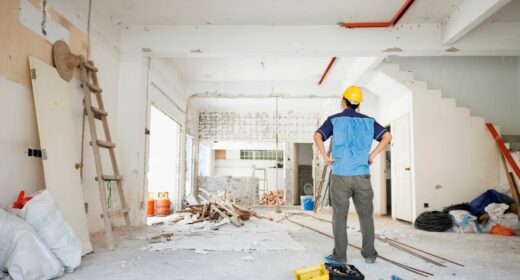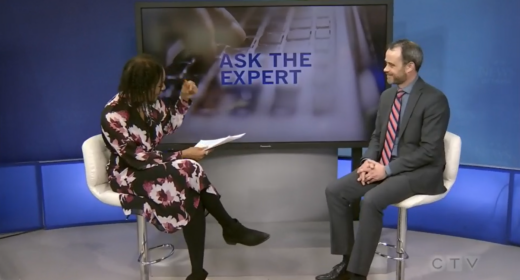In a recent live interview Craig O’Brien talked about what businesses can do to avoid slips and falls on their premises in winter.
Below is the transcript of that interview.
Intro (Paul): Hi there. My name is Paul Taylor-Sussex from Nelligan O’Brien Payne and today we are chatting with Craig O’Brien who is the head of our business law group and our commercial litigation group.
Paul: Welcome Craig. Mercury is falling; snow is forecast in Ottawa which means skating, skiing, beaver-tails a lot, but also means slippery walkways. So, what are things that businesses can do to prepare for winter?
Craig: Well it’s funny because every year at around this time, I start top field a lot of phone calls from businesses who are concerned about the potential risk of slip and falls. All of these businesses who are calling me have had the unfortunate experience of already having to go through defending a slip and fall claim. I never seem to get calls from businesses who haven’t had that unfortunate experience. And to me, that teaches that those who have gone through the experience are very keen to avoid ever having to go through that experience again. But unfortunately, those who have not gone through the experience appear to be somewhat blind to where their risks are and there are a few simple things that businesses can do to reduce their risk of being sued in a slip and fall claim and realistically, whether they’re negligent or not, whether the business caused the slip and fall through a failure on their end is almost irrelevant to the damage that it can do to a business. Legal fees alone can be devastating to a business, especially one that is just starting out and facing a slip and fall because of the oversights or lack of diligence which can cause a business that would otherwise thrive, to be rendered insolvent. Equally important for context, the weather is such that Ottawa frequently has significant slippery periods and the courts while they put a standard of care, being one of a reasonable person. What would a reasonable person do to make their walkway reasonably safe? The court seemed to see that person as having obsessive-compulsive disorder. It is a standard of near perfection and it’s a difficult one that businesses ignore at their own peril and taking some reasonable and simple steps at the outset before the weather really turns and before the snow really comes, can be the difference between thriving and not even surviving.
Paul: Well that sounds fairly over-the-top, what do you mean by that?
Craig: Well, the innocent victim of the slip and fall would not consider it over-the-top. The best way to answer that is to give you an example. A few years ago, I was dealing with a case where a landlord was being sued for a slip and fall for a slippery walkway out front of their building. Their building was located in downtown Ottawa. There had been forecast that there would be 35 plus centimeters of snow on a given day. That day arrives, and there’s a slip and fall on the property. At the same time, the landlord has 5 of his own employees out clearing, salting, and doing their work. And in fact, the individual had slipped on a zone that had been cleared less than a half an hour prior while in the court arguing a motion on the matter, the judge in his wisdom provided his opinion. And his opinion was this: The landlord knew that there was snow coming and should’ve got more staff out there. That seems to be the standard. It’s one where the courts frequently look at it as if a fall occurred, there must be a reason. That reason must be that it’s slippery and who’s in control of whether it’s slippery or not? The occupier of the premises. So while it is a standard of a reasonable person, that reasonable person has pretty high standards for themselves.
Paul: Yeah, so it sounds like a problem for the landlord to deal with, is that right?
Craig: Frequently it is, yes. But not necessarily and that begs the issue, begs the problem. Most small businesses are renting a premise from a landlord. And I’ll give you another example because it’s probably the best way to tell the story. Usually when you’re entering in a lease, you’ll have a list of common areas written right into the lease and that will refer back to a schedule and the schedule will just be a map of the property and on thick black marker, there’s an outline of the parking lot, of the walkways and those are common areas. Business owner comes into work one day and a Process Server’s there serving them with a statement of claim. Somebody has fallen right at the entrance way to their particular retail outlet. So they take the claim, they walk down to the property management company or the landlord and they give it to them, and they say “please deal with this”. Only to be told that actually, when you voluntarily cleared the snow from in front of your entrance, you didn’t properly salt and sand it after. And as a result, you created the very hazard over which the person tripped and fell, and we’re not defending you. In fact, we’re taking the position that you created the hazard and as a result, you have the landlord and it’s tenant fighting each other helping the plaintiff to prove his case and with really little to no redress, unless you’ve done a proper review of your lease and really, if you’re going to be the tenant, that’s the stage that you need, to look at this appropriately. There’s two things to look for. First of all, in the common areas, it needs to be clearly spelled out that the landlord is fully responsible for all common areas. Secondly, you would want to know the name and identity of the snow removal company to ensure that they’re properly bonded and insured. You also want to makes sure that you landlord is properly insured, obviously. And frequently, in leases there is a provision that the landlord is required to carry insurance in their own name for common areas. You can often get added to that, that the tenant will be an additional named insured under the landlord’s policy and if you’re named insured under the landlord’s policy that can go a long way to making sure that if a claim does arise from the common areas that it will be the landlord and not you responding.
Paul: So obviously, snow accumulation can vary through the winter. So when it comes to a snow removal, is there such thing as too much snow?
Craig: No, actually there’s no such thing as too much snow. The only issue with too much snow, is the standard term in a snow removal contract covers up to 256 centimeters of snow, in a winter and you’ll have to pay extra if more snow accumulates than that 256. Your real problem though is the not enough snow. What happens when there’s a trace amount of snow or a minuscule amount of snow that falls? What happens is there’s a freeze thaw cycle. So, two things: first, most snow removal contracts have a trigger of 5 centimeters. Less than 6 centimeters, the snow removal company is not required to attend at your property. You don’t need a lot of snow to have slippery snow. You don’t need to have a lot of snow that’s been compacted by cars going in and out of the parking lot, by others people’s foot traffic it’s stamping it down.
Paul: It can also cover the ice as well.
Craig: Exactly, that will. So you have the double whammy of a little bit of snow on top of compacted snow, is a far more risk than 45 centimeters of snow that’s just sitting there in power un-cleared. So that’s a major problem. The other major problem is the freeze thaw cycle as I’m sure everyone can just guess is when there’s no snow that’s come down at all, but the weather in the mid-afternoon has gone up to 5, 8, 10 degrees Celsius and overnight it goes to minus 10 or 15. At 6 a.m. the following morning, that walkway is going to be frozen salt and that is not necessarily a condition that your snow removal company is even contracted to deal with. SO the default is that the occupier or the owner of the property is responsible for the maintenance on the property if you get less than 5 centimeters of snow or you get a freeze thaw cycle then you’re going to be responsible for that snow clearance yourself. The other issue with a freeze thaw cycle, and this is one that people often get into trouble on is that the thaw will melt the salt that you’ve put on for the explicit purpose of making it melt. So it gets warm, you’ve diluted the salt to a point where it’s not going to prevent freezing again and then overnight it’s frozen and sure enough, that’s the morning that somebody’s at your business early and now trying to see if you’re open so they can buy a birthday cake or something. And they’re the ones who you won’t even meet, and you’ll get a statement of claim from months or go to 2 years later informing you that they’ve got a massive injury and that you’re responsible.
Paul: Yep, it’s obviously that there’s lots of ice and snow outside building and in front of buildings but what are the other hazards that businesses should be aware of?
Craig: Right, so for the examples I’ve given you are basically the strip mall example, there’s somebody coming directly from the outside into your establishment. We’re on the 3rd floor of the building; everyone who comes to our floor needs to go through the lobby area in the main floor, get into the elevators and then are up into our building. If they’ve got snow on their boots, that snow will eventually melt but not right away and it will be on the floor of our reception area. Every business has the same situation and the same problem. So, again you have the situation where an innocent individual is walking into your business, they have snow on their boots and that snow melts and they leave. The equally innocent person who’s coming immediately behind them, walks into your beautiful marble floors, doesn’t see the water that’s accumulated right in the center of your reception area and they have a massive slip and fall. Potentially a head injury, potentially a broken wrist, arm, and you’ll be responsible for that because that is within your premise and that is a hazard. So, it doesn’t really matter that you are immediately between the inside of the outside or whether you’re at the heart of a larger building. The risks for slip and falls and the weather related winter risks in Ottawa are always going to be there. And I know it sounds pessimistic but realistically effective maintenance is key.
Paul: Yep, so you mentioned maintenance, what other tips do you have for local businesses?
Craig: Well, it’s not just enough to do the maintenance. You got to record the maintenance. Based on your limitations act, a plaintiff has 2 years to sue from the day of the accident and the day they discovered their injuries which usually is the same thing in the instance but 2 years down the line. You’re going to be asked as the business owner to attend what’s known as examinations for discovery to give your evidence and your information as to what happened. You’ll be facing somebody who as a plaintiff, has been injured and has dealt with this intimately, every day since. So not even from an honesty perspective but from whose memory do we prefer. The court is going to understand that the injured plaintiff has made this a key part of their life, they’ve absorbed the information, they’ve dealt with the injury, they’ve had the headaches, the lack of sleep, the pain and the suffering, all of that. Versus a business owner who’s running a business and may have only been served with the claim a year and a half later, whose memory is going to be better? The only defense to that is proper record-keeping. I know it’s a hassle, I know, your one or two employees when they go out and mop that slippery marble floor to take a note and have that note saved in a particular spot to say, you know at 10:43 I mopped up this floor but you need to have that pre-accident. Whether or not that’s the day there’s a slip and fall. Even the court will be interested to see what kind of business owner are you, are you one who takes proactive steps? Are you keeping records of what you do? All that sort of thing does become at least for color, very relevant in all of these claims, so keeping notes and having an effective way to maintain those notes is very important. If you’re a tenant who has a landlord responsible for the outdoor maintenance and you have a complaint or request for extra service, send that by text message, send that in an e-mail, send that in some way that years from now, you’ll be able to go back and recover it. So when the question gets asked, how you know that you contacted “get rid of snow” removal on February the 13th, you have evidence of it. When you’re signing a lease, it is imperative to know who’s responsible for snow removal. Who’s responsible for snow removal? Who’s responsible for getting what types of insurance? To know the limits of that insurance, if your lease allows you to be an additional name insured. Make the landlord give you a copy of the certificate of insurance that shows you as an additional name insured and ultimately, keep all of those records in a spot that is ready and accessible. Winter is a great time for businesses in Ottawa by the way. I mean, in a lot of these retail outlets, both shops, restaurants, coffee shops, all of it. It’s a time of the year where people are more willing to stick around your store. They’re more willing to browse and end up with purchases as a result. They want to avoid the winter, they want to stay inside. If you have a cozy warm and welcoming business, people are going to stick around. But the flip side of that winter, of that desire for people to stay inside is that there’s more risks of getting to your place. And if you’re live getting to those risks, then you’ll be able to limit your liability. Risks while at the same time, ensuring that your patrons are comfortable, happy and that you have a thriving business as this a result. It’s not meant to be fearful, this little update. But, it is more if you know your risks and face them head-on then it’s almost Murphy’s Law and they will not come.
Paul: Yep, okay there’s some great tips there from Craig for local businesses. So thank you. If you have any further questions you can contact our business law group or our commercial litigation group here at Nelligan O’Brien Payne.



